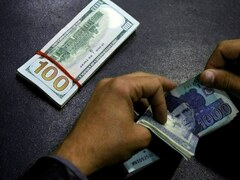Its not an easy time for any country in the world today. Asia-Pacific is no different; S&P had no sovereign upgrade in the region for the past six months.
And, why should Pakistan be any different? The renowned rating agency decided to keep Pakistans B- rating intact after six months, though it does warn of the potential risks that the country faces.
Yet, despite escaping S&Ps dreaded downgrade, Pakistans current rating still stands below any of its close regional peers; Sri Lanka, India and Bangladesh.
Ironically, Pakistans dependence on external funding has been highlighted as strength by the agency. Its sad to see the country has no significant intrinsic strength based on its own potential, and rather has donor dependence as its credential.
Pakistans growing political turbulence has not gone unnoticed by S&P, especially the mayhem over PM Gilanis court proceedings. The burgeoning political turmoil does not only highlight the governments inefficiency in handling issues of such grave matter, but are also believed to not go down very well as far as Pakistans international relations and foreign donors are concerned.
On the economic side, the greatest concerns identified are on the balance of payments side. With a current account deficit of $2.4 billion, and an expanding trade deficit, and a capital account showing dwindling FDI inflows, the balance of payments pose a great threat to the countrys economic stability.
The current circumstances of acute political uncertainty, fiscal weaknesses and balance of payments uncertainty, pose potential downgrading risks for Pakistans next assessment by the S&P. On the other hand, fiscal consolidation efforts, if taken, may help bring Pakistan a notch up from its current B- rating.
Given the current year is an election year one does not expect any major policy measures that would contribute to fiscal consolidation. Tax reforms, subsidy reduction or rationalisation, power sector reforms and restructuring of loss-making SOEs may be kept at bay during the run-up to the elections. This downs any prospects of a possible upgrade.
At the same time, while the political situation may not improve substantially in the coming few months, there is less likelihood for it to become worse. Thus, while the risk of a downgrade in S&Ps next assessment is high, the political situation of a more or less status quo makes it quite probable for the B- rating to be maintained after the coming six months.
BR100
11,776
Decreased By
-377.8 (-3.11%)
BR30
34,410
Decreased By
-1457.9 (-4.06%)
KSE100
111,327
Decreased By
-3545.6 (-3.09%)
KSE30
33,993
Decreased By
-1274 (-3.61%)






















Comments
Comments are closed.